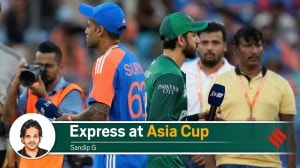Numbers salve NDA’s bruised face on Gujarat
The Government won the censure motion on Gujarat by 87 votes but after the 16-hour debate that ended in the Lok Sabha early this morning, it...

The Government won the censure motion on Gujarat by 87 votes but after the 16-hour debate that ended in the Lok Sabha early this morning, it came out with several red and bruised faces.
|
A B Vajpaye
|
The plight of refugees, over 1 lakh and climbing, the daily violence and curfew found hardly any mention as speaker after speaker kept blaming each other. These distractions, on several occasions, seemed to acquire more importance than the debate itself.
At around 3.30 am, CPM’s Somnath Chatterjee proposed the idea that the House condemn Godhra and what happened subsequently. Prime Minister A B Vajpayee agreed and egged on by Home Minister L K Advani’s nod, he asked Sonia Gandhi if she approved. Sonia agreed as well but after the voting, the proposal was promptly forgotten as MPs rushed out on their way home.
Earlier, Vajpayee wrapped up the proceedings defending himself against the charge of doublespeak but not before Defence Minister George Fernandes made things extra difficult for the Government. So much so that Home Minister L K Advani had to get up and snub him—politely.
Fernandes said he saw ‘‘nothing new’’ in the mayhem let loose in Gujarat.
‘‘A pregnant woman’s stomach being slit, a daughter being raped in front of her mother,’’ said Fernandes, ‘‘aren’t new things.’’ They have been happening, he claimed for 54 years, and on the streets of New Delhi in 1984. Fernandes said all this with a straight face even after being heckled and booed for over an hour by the Congress-led Opposition.
Fernandes’s attempt to downplay Gujarat by comparing it with earlier riots not only drew flak from the Congress but was also met with a subtle disapproval from Advani. Making it clear, though not in so many words, that he did not share the view, Advani said the Gujarat communal unrest had come as a personal anguish and shock to him.
Fernandes, on the contrary, exhibited no such shock. Instead, he inquired: ‘‘Are the killings, murders and rapes taking place for the first time in the country? Nothing different is happening in Gujarat than whatever happened int he country during past 54 years…It is not for the first time that our international image has taken a beating. We should not feel bothered about such things.’’
Vajpayee’s much-awaited intervention came as an anti-climax to many. Though he did delve on Gujarat, as expected, the PM spent several minutes blasting the media and then a few more explaining his self-contradictory remarks of the past few weeks.
‘‘The media,’’ Vajpayee said, ‘‘will have to reconsider its role seriously. To show murder, arson and looting again and again, day after day, is not proper.’’ Someone from the Congress benches shouted this could not be helped because these incidents were taking place day in and day out. ‘‘We don’t want to regulate the media,’’ Vajpayee continued. ‘‘It has to regulate itself.’’
Breaking his silence for the first time on his changing statements on Gujarat, Vajpayee said the accusation has greatly harmed his image and he would deny the allegations. He then read at length portions from his Goa speech in which, he said, he had referred to ‘‘some Muslims’’ as taking up the way of ‘Jehad’ and vitiating the communal harmony in the country.
‘‘Why will I change my statements? What political objective can I gain? What I said in Gujarat, I said in Goa. To say that I am opposed to Islam and Muslims is a personal insult to me.I have been deeply pained by the charges,’’ he told the House.
Vajpayee’s silence on Gujarat Chief Minister Narendra Modi was conspicuous, but Home Minister Advani bailed him out. ‘‘Our Government believes that Modi’s resignation will not solve the problem in Gujarat,’’ Advani insisted.
While conceding ‘‘administrative and police lapses’’ in riot-torn Gujarat, Advani held that to speak about ‘‘deliberate carnage and state-engineered genocide’’ was unacceptable.
Photos





- 01
- 02
- 03
- 04
- 05


























